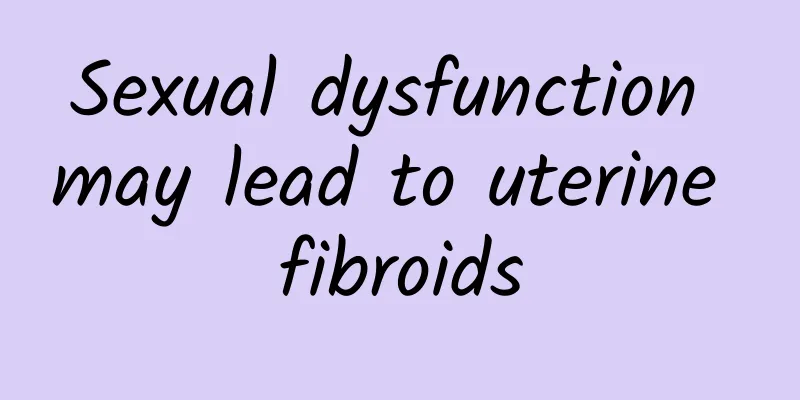What should I do if I have uterine fibroids? Are there any folk remedies for treating uterine fibroids?

|
Uterine fibroids are a common disease of the female uterus. Most of them are benign tumors. Only a few will turn into malignant tumors, but you still need to be alert to this risk. So, what if you have uterine fibroids? Are there any folk prescriptions for treatment? People with uterine fibroids should remain calm and seek medical treatment immediately to eliminate malignancy. The main treatment methods are as follows: 1. Follow-up observation: Asymptomatic small uterine fibroids generally do not require treatment, especially in menopausal women. After menopause, most uterine fibroids will gradually shrink or even disappear. You can follow up every 3-6 months. 2. Drug treatment is mainly short-term treatment, mainly suitable for patients with uterine fibroids who have surgical indications. Preoperative medication is used to correct anemia, reduce uterine volume, avoid intraoperative bleeding and reduce surgical difficulties; near-menopausal women, uterus smaller than 10 weeks of pregnancy, mild symptoms; patients with surgical contraindications due to other complications. Because the drugs used have side effects, they are not suitable for long-term use. 3. Surgical treatment Surgery is the most commonly used treatment for uterine fibroids. It is mainly divided into hysterectomy and myomectomy. The drugs used in medical treatment have side effects and are not suitable for long-term use. In addition, myomectomy can still recur. At this time, some friends may want to treat it through some folk prescriptions. The following are two folk prescriptions for treating uterine fibroids: 1. 15g of Radix Angelicae Pubescentis, 15g of Angelicae Dahuricae, 20g of Carapax Tripterygium, 15g of Rhizoma Curcumae, 20g of Radix Salviae Miltiorrhizae, 15g of Carthamus Tinctorius, and 15g of Paeonia lactiflora. Grind them into coarse powder, put them into a cloth bag, steam and iron the lower abdomen, 1 to 2 times a day, 20 to 30 minutes each time. Each bag can be used continuously for 5 to 7 times, 10 days as a course of treatment, and stop using during menstruation. 2.1 excrement, 10 g of Clematis, dry and grind into powder, mix with appropriate amount of rice wine to prepare the navel, and apply the plaster. Apply once a day, each time for about 1 hour, and stop using during menstruation. |
<<: What should I do if I have uterine fibroids? Folk remedies for the treatment of uterine fibroids
Recommend
Can I get pregnant if I have a left ovarian cyst? Will it have adverse effects on the fetus?
Many people are afraid to have children because o...
How to prevent habitual miscarriage
How to prevent habitual miscarriage? Although bot...
What to eat after surgery for cervical warts
In today's society, many women are worried ab...
How to prevent Bartholinitis
Nowadays, gynecological diseases among women are ...
Is it difficult to get pregnant with adenomyosis? Will it cause infertility?
It is difficult to get pregnant with adenomyosis....
Is bilateral polycystic ovary serious?
Polycystic changes on both sides of the ovaries a...
What causes irregular menstruation? Here are 6 foods that can regulate menstruation
Irregular menstruation in women can be caused by ...
What are the symptoms of acute cervicitis
Acute cervicitis is a common gynecological diseas...
Is endometrial tuberculosis contagious?
Endometrial tuberculosis is not an infectious dis...
Experts introduce the dangers of endometrial tuberculosis
Many people do not care much about diseases like ...
Prevent uterine fibroids from small symptoms
There are no obvious symptoms of uterine fibroids...
What medicine can be added to mugwort to treat vulvar leukoplakia? What diseases can mugwort treat?
In recent years, with the increasing interest and...
Dysmenorrhea may be caused by some endocrine factors
Dysmenorrhea may be caused by some endocrine fact...
Can I take painkillers for dysmenorrhea? Not the best solution
There are several days of menstruation every mont...
Gold standard for diagnosis of threatened abortion
Pregnant women are very afraid of threatened abor...









